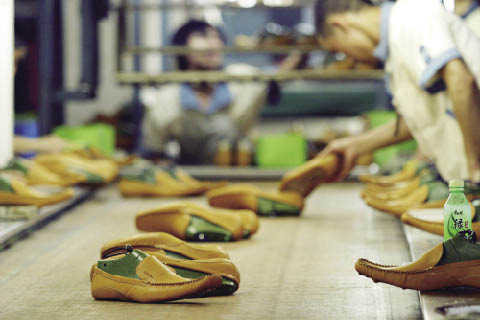| Footwear Tycoon Xu Chengjian
By XIAO QINCHAO & XU XIONGLIANG
IN only six years, Xu Chengjian has forged a nationwide marketing network and put his brand name "Spider King" in the ranks of "China's shoe kings." According to Xu, his success does not lie in his wisdom, nor in his diligence, but in his courage.
 |
| The global financial crisis has slowed down the shoe-making industry in Wenzhou. |
First Bucket of Gold
Xu Chengjian used to be a carpenter. In 1986, he found that a vendor of small commodities, leather shoes and garments earned much more than a wood worker. He wanted to start a business, but had no capital. The idea came to him that he could act as a broker between local enterprises and the market outside. He went to Yongjia and negotiated the ex-factory price, and then borrowed RMB 200 in traveling expenses to seek buyers. The factories would not send out goods without getting the cash, so Xu Chengjian bet on the buyers, whom he persuaded to accept his terms: "Goods are delivered upon receipt of the payment."
After the first few contracts were fulfilled, Xu Chengjian was confident of his new career choice. He continued to recommend new clients, and accumulate trust. At that time, he did not know that his business mode constituted a "virtual operation" – he had neither an enterprise nor products but marketed his mobility between manufacturers and wholesalers. Xu Chengjian filled his first bucket of gold this way.
One day in 1991, a relative of his asked, "I have found two partners to produce and sell sports shoes. How about joining us?" In a heartbeat, Xu Chengjian agreed and has been engaged in the shoe business ever since.
As part of the joint venture, Xu Chengjian was responsible for the production of sports shoes. "At that time, I could not even tell artificial leather from the real stuff," he admitted. One day, his factory obtained a processing order, but he subcontracted it to another factory. "I wanted to see why that factory could produce better, more inexpensive shoes." As party A of the subcontract, the factory was obliged to let him supervise and observe every detail of production.
In 1994, the sports shoes business declined, and Xu Chengjian turned to making students' shoes. He leased the best stall in a big Beijing market. "The shoes sold well, but returns were terrible and whittled down profits. From that time on, I was determined to make quality shoes," he said.
Xu Chengjian spared no expense hunting for talent. In 2000, when the monthly salary of a government functionary was RMB 1,000, he offered an annual salary of RMB 118,888, plus one yuan per pair of shoes sold, to a teacher who was good at shoe design and production management. Despite the incentives, the teacher was hesitant to venture into the business world. Xu told him he would wait. Two years later, the teacher came on board to take charge of the company's production.
|
